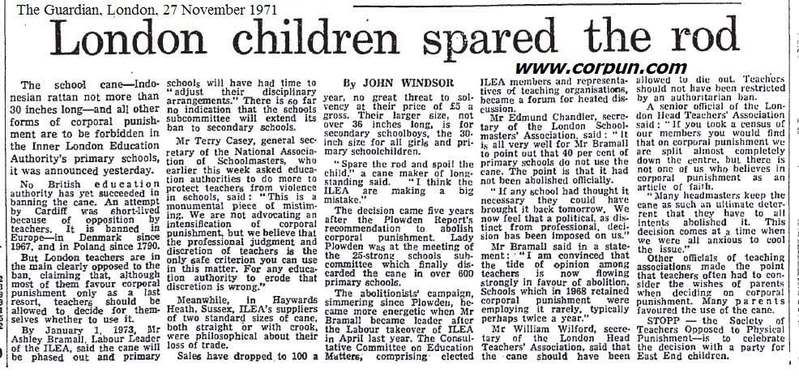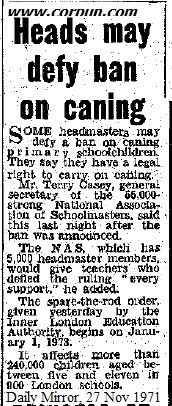|
The Guardian, London, 27 November 1971London children spared the rodBy John Windsor
No British education authority has yet succeeded in banning the cane. An attempt by Cardiff was short-lived because of opposition by teachers. It is banned in Europe -- in Denmark since 1967, and in Poland since 1790. But London teachers are in the main clearly opposed to the ban, claiming that, although most of them favour corporal punishment only as a last resort, teachers should be allowed to decide for themselves whether to use it. By January 1, 1973, Mr Ashley Bramall, Labour Leader of the ILEA, said the cane will be phased out and primary schools will have had time to "adjust their disciplinary arrangements." There is so far no indication that the schools subcommittee will extend its ban to secondary schools. Mr Terry Casey, general secretary of the National Association of Schoolmasters, who earlier this week asked education authorities to do more to protect teachers from violence in schools, said: "This is a monumental piece of mistiming. We are not advocating an intensification of corporal punishment, but we believe that the professional judgment and discretion of teachers is the only safe criterion you can use in this matter. For any education authority to erode that discretion is wrong." Meanwhile, in Haywards Heath, Sussex, ILEA's suppliers of two standard sizes of cane, both straight or with crook, were philosophical about their loss of trade. Sales have dropped to 100 a year, no great threat to solvency at their price of £5 a gross. Their larger size, not over 36 inches long, is for secondary schoolboys, the 30-inch size for all girls and primary schoolchildren. "Spare the rod and spoil the child," a cane maker of long standing said. "I think the ILEA are making a big mistake." The decision came five years after the Plowden Report's recommendation to abolish corporal punishment. Lady Plowden was at the meeting of the 25-strong schools subcommittee which finally discarded the cane in over 600 primary schools. The abolitionists' campaign, simmering since Plowden, became more energetic when Mr Bramall became leader after the Labour takeover of ILEA in April last year. The Consultative Committee on Education Matters, comprising elected ILEA members and representatives of teaching organisations, became a forum for heated discussion. Mr Edmund Chandler, secretary of the London Schoolmasters' Association, said: "It is all very well for Mr Bramall to point out that 40 per cent of primary schools do not use the cane. The point is that it had not been abolished officially. "If any school had thought it necessary they could have brought it back tomorrow. We now feel that a political, as distinct from professional, decision has been imposed on us." Mr Bramall said in a statement: "I am convinced that the tide of opinion among teachers is now flowing strongly in favour of abolition. Schools which in 1968 retained corporal punishment were employing it rarely, typically perhaps twice a year." Mr William Wilford, secretary of the London Head Teachers' Association, said that the cane should have been allowed to die out. Teachers should not have been restricted by an authoritarian ban. A senior official of the London Head Teachers' Association said: "If you took a census of our members you would find that on corporal punishment we are split almost completely down the centre, but there is not one of us who believes in corporal punishment as an article of faith. "Many headmasters keep the cane as such an ultimate deterrent that they have to all intents abolished it. This decision comes at a time when we were all anxious to cool the issue." Other officials of teaching associations made the point that teachers often had to consider the wishes of parents when deciding on corporal punishment. Many parents favoured the use of the cane. STOPP -- the Society of Teachers Opposed to Physical Punishment -- is to celebrate the decision with a party for East End children.
Daily Mirror, London, 27 November 1971Heads may defy ban on caning
Mr. Terry Casey, general secretary of the 65,000-strong National Association of Schoolmasters, said this last night after the ban was announced. The N A S, which has 5,000 headmaster members, would give teachers who defied the ruling "every support," he added. The spare-the-rod order, given yesterday by the Inner London Education Authority, begins on January 1, 1973. It affects more than 240,000 children aged between five and eleven in 900 London schools. |
About this website |



